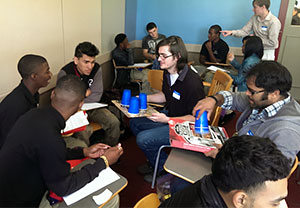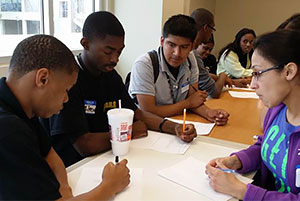Program Gives Back to Our Neighbors and Encourages Students to Pursue College

The Cougars and Houston Area Math Program is making connections with high schools
close to the University of Houston and offering students a fresh look at math and
a first look at the college experience.
The volunteer-driven program, known as CHAMP, launched in September 2013 as an outreach effort of the Department of Mathematics in the UH College of Natural Sciences and Mathematics. This spring, CHAMP is partnering with Houston Independent School District’s Hope Academy and Stephen F. Austin High School.
Giving Back to UH’s Neighbors
 “Part of CHAMP’s purpose is to give back to the community, so we are working with
schools in the Third Ward and East End,” said Mark Tomforde, director of CHAMP and
UH associate professor of mathematics. “We also want to the increase diversity and
number of students majoring in the STEM fields of science, technology, engineering
and math.”
“Part of CHAMP’s purpose is to give back to the community, so we are working with
schools in the Third Ward and East End,” said Mark Tomforde, director of CHAMP and
UH associate professor of mathematics. “We also want to the increase diversity and
number of students majoring in the STEM fields of science, technology, engineering
and math.”
Many groups are underrepresented in STEM fields, including African Americans, Hispanics, women, and students who are the first generation in their family to attend college.
Tomforde says the program also wants to get some students who would not think about going to college to consider it.
CHAMP partnered with HOPE Academy in the fall. The Academy provides a smaller school environment for students who have not had success in a traditional school setting. In January, students from Stephen F. Austin High School joined the program. Nineteen students from HOPE and Austin High School are participating this spring.
Applying Math to All Aspects of Life
 “In most high schools in Texas, math is the subject that is the hardest for students
and the biggest obstacle to graduation,” Tomforde said. “We show students aspects
of math they don’t get to see in the high school classroom.”
“In most high schools in Texas, math is the subject that is the hardest for students
and the biggest obstacle to graduation,” Tomforde said. “We show students aspects
of math they don’t get to see in the high school classroom.”
Lessons are designed to show how math is applicable to all aspects of our society, Tomforde added.
Each semester, the students come to campus for 11 weekly sessions spending an hour and a half with UH professors and students working on interesting problems and topics such as probability, mathematical logic and games.
On a typical day, a concept is introduced, and the class breaks into small groups. Lessons involve hands-on activities, and students get back together to report what they have learned at the end of the session. The small groups are led by UH undergraduate and graduate students who volunteer their time to help with the program.
Volunteer Driven
Tomforde chose to start the program without any grant funding. A team of faculty, graduate students and undergraduates organized CHAMP and served as instructors and small-group facilitators.
“We felt more of a difference could be made if we put all our effort into the students and the program rather than into the administration of a grant,” he said. “It worked very well; the undergraduates who volunteered as facilitators went out of their way to be involved in the program.”
Math major Renat Tatarin served as a facilitator in the fall and saw the impact of volunteering.
“During one of the first classes, a student asked me, ‘Why are you doing this? What are you getting out of it?’” Tatarin said. “The answer was easy; we’re all volunteering because we want to help you guys succeed.”
After that, Tatarin felt the bond between the HOPE Academy students and UH student volunteers strengthen. “They paid closer attention which resulted in a better experience for everyone. They trusted that we wanted to help them which was key to the program’s success,” he said.
Early Results Positive
Results of the program will be clearer once the spring session is complete, but results from a survey at the beginning and end of the fall session are promising.
“At the end of the fall session, we had more students who were interested in going to college, and some students who had been thinking about business or accounting were now more interested in majoring in STEM fields,” Tomforde said.
The superintendent of Hope Academy, Andre' Mathews, saw many benefits to CHAMP and felt the program exposed his students to a college atmosphere through the eyes of mathematics and relationship building.
“The experience gave students an opportunity to evaluate where they are in terms of college readiness and what needs to be done to reach that level of success,” Mathews said. “More importantly, it made my students believe they are capable of attending a four-year college successfully.”
The program had a positive impact on UH students as well.
Tatarin encourages other students to volunteer; “It’s only three hours a week for facilitators, but for the high school students, it could be the difference between going to college and not.”
“This is an opportunity to become that person in a young student’s life that points them in the right direction, to better themselves and maybe one day return the favor for someone else,” he said.
- Kathy Major, College of Natural Sciences and Mathematics